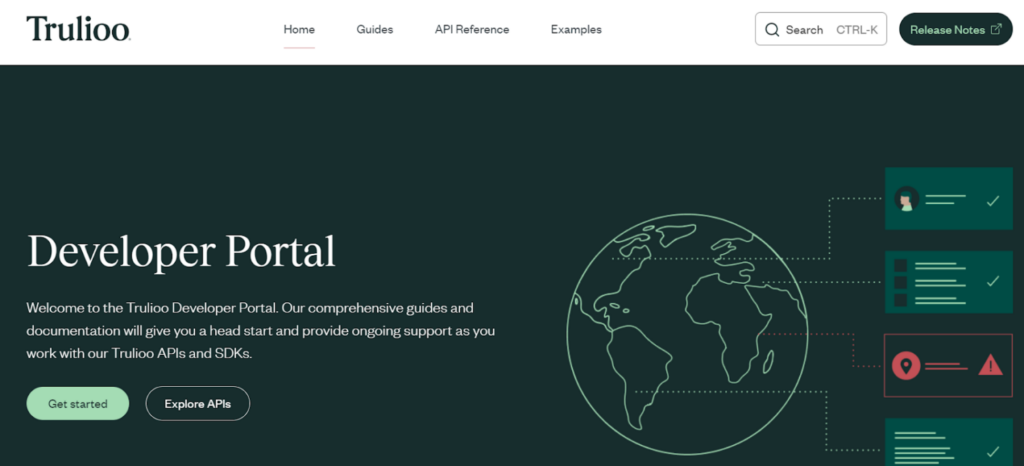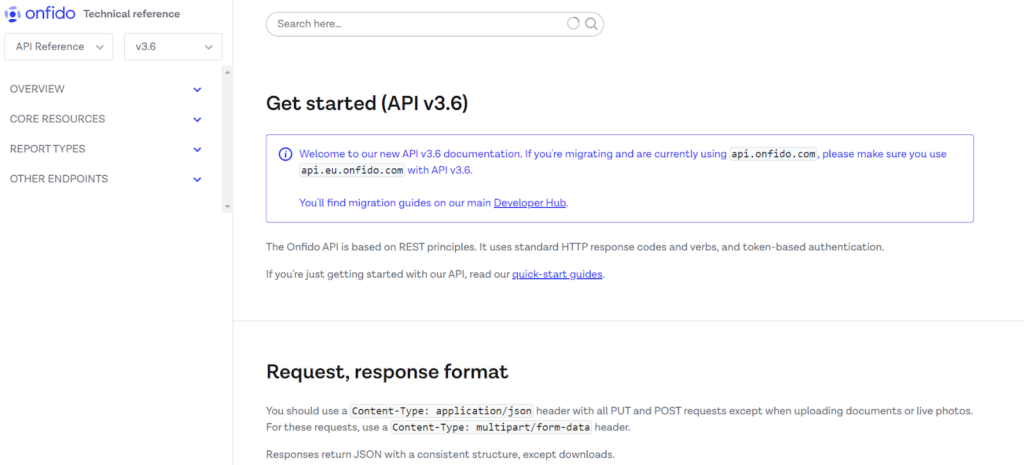and the distribution of digital products.
Best 7 KYC API to look out for | Check NOW!
KYC KYC KYC, takes a lot of time ain’t it? Specially when you need your account ASAP xD
Happened with me a lot of times, but still we need it, it is the need of the hour, I mean without it, increase of scams would be at par, plus considering the number of hackers and technologies related these days, I prefer offline direct face to face meet up, anyways, I am here to help for KYC APIs today : D
KYC APIs, or Know Your Customer Application Programming Interfaces, are software interfaces that allow businesses to integrate KYC functionality into their applications, websites, or systems. These APIs enable automated identity verification and compliance checks by connecting to external databases, services, or third-party providers specializing in identity verification and KYC compliance.
KYC APIs typically offer a range of features and functionalities to facilitate the verification of customer identities, including:
 The Features are:
The Features are:
- Identity Verification: KYC APIs enable businesses to verify the identities of their customers by checking government-issued identification documents such as passports, driver’s licenses, or national identification cards.
- Document Verification: These APIs can perform automated checks on document authenticity, including verifying the validity of identification documents, detecting alterations or forgeries, and extracting relevant information from documents.
- Biometric Verification: Some KYC APIs support biometric verification methods such as facial recognition, fingerprint scanning, or voice recognition to further enhance identity verification processes.
- Compliance Checks: KYC APIs help businesses ensure compliance with regulatory requirements by conducting background checks, screening against watchlists or sanctions lists, and assessing risk levels associated with customers.
- Data Validation: These APIs validate customer-provided information such as names, addresses, and contact details against authoritative databases to ensure accuracy and completeness.
- AML (Anti-Money Laundering) Checks: KYC APIs may include features for detecting suspicious activities or transactions that may indicate potential money laundering or terrorist financing activities, helping businesses comply with AML regulations.
By integrating KYC APIs into their systems, businesses can streamline their onboarding processes, enhance security and fraud prevention measures, and ensure compliance with regulatory requirements. Additionally, KYC APIs enable businesses to scale their operations efficiently and provide a seamless and secure experience for their customers.
How does a KYC API work?A KYC API works by allowing businesses to send customer information, such as identification documents or personal details, to a third-party service provider via the API. The service provider then conducts various verification checks, including document verification, identity authentication, compliance screening, and risk assessment. Once the checks are completed, the service provider returns the results to the business via the API, allowing them to make informed decisions about customer onboarding or transactions.
What are the benefits of using KYC APIs?Using KYC APIs offers several benefits, including streamlined customer onboarding processes, enhanced security and fraud prevention measures, improved compliance with regulatory requirements, and increased operational efficiency. KYC APIs automate the verification process, reducing the need for manual intervention and speeding up the onboarding process for customers. Additionally, KYC APIs enable businesses to scale their operations efficiently and provide a seamless and secure experience for their customers.
Are KYC APIs secure?Yes, KYC APIs are designed with security in mind to protect sensitive customer information and ensure compliance with data protection regulations. Most KYC APIs use secure encryption protocols to transmit data between the business and the service provider, ensuring that customer information remains confidential and secure. Additionally, reputable KYC service providers implement robust security measures, such as data encryption, access controls, and regular security audits, to protect against unauthorized access or data breaches.
Also Read ➤ ➤ 10 Best Crypto API for Developers
The Main Agenda – Best KYC API SEON
SEON

SEON offers a comprehensive suite of KYC integration solutions to businesses seeking to enhance their fraud prevention and compliance measures. Their KYC integration resources provide developers with tools and documentation to seamlessly integrate KYC functionality into their applications or systems.
Check APISEON’s unique points include its focus on combating fraud through advanced behavioral biometrics, device fingerprinting, and machine learning algorithms. Additionally, SEON offers customizable KYC workflows tailored to specific business needs, ensuring flexibility and scalability for businesses of all sizes.
Pros of SEON’s KYC integration resources include their advanced fraud prevention capabilities, which help businesses detect and prevent fraudulent activities effectively. SEON’s focus on behavioral biometrics and machine learning algorithms enhances the accuracy and reliability of KYC checks, reducing the risk of fraud and identity theft. Furthermore, SEON’s customizable KYC workflows allow businesses to tailor their verification processes to specific risk profiles and compliance requirements.
DocumentationHowever, one potential limitation is that SEON’s advanced features may require additional technical expertise to implement and configure effectively. Additionally, businesses may need to consider the cost implications of integrating SEON’s KYC solutions into their systems.
Also Read ➤ ➤ 8 Best Cryptocurrency APIs for Developers [February 2024]
Trulioo
Trulioo offers a robust set of APIs and developer tools for businesses seeking to streamline their KYC processes and comply with regulatory requirements. Their KYC API documentation provides developers with comprehensive guidance on integrating identity verification and compliance checks into their applications or systems.
Check APITrulioo’s unique points include its global coverage, with access to data sources from over 195 countries, enabling businesses to verify customer identities worldwide. Additionally, Trulioo offers real-time identity verification capabilities, allowing businesses to perform instant KYC checks and onboard customers quickly.
Pros of Trulioo’s KYC API include its extensive global coverage and real-time verification capabilities, which enable businesses to verify customer identities quickly and accurately. Trulioo’s API documentation provides developers with clear and concise guidance on integrating KYC functionality into their applications, reducing implementation time and effort. Furthermore, Trulioo offers a range of compliance checks, including AML (Anti-Money Laundering) and watchlist screening, helping businesses ensure regulatory compliance.
DocumentationHowever, one potential limitation is that Trulioo’s extensive global coverage may result in varying data quality and accuracy across different regions. Additionally, businesses may need to consider the cost of using Trulioo’s KYC API, as pricing structures may vary based on usage and features.
Onfido
Onfido provides a suite of identity verification and KYC solutions through its developer-friendly API documentation. Their KYC API allows businesses to verify the identity of their customers quickly and securely using a range of verification methods, including document verification, facial recognition, and biometric checks. Onfido’s unique points include its focus on providing seamless user experiences, with features such as real-time verification and AI-powered fraud detection.
Check APIAdditionally, Onfido offers extensive compliance checks, including AML (Anti-Money Laundering) and PEP (Politically Exposed Persons) screening, helping businesses ensure regulatory compliance.
Pros of Onfido’s KYC API include its user-friendly documentation and easy integration process, which enable developers to quickly implement identity verification functionality into their applications or systems. Onfido’s focus on providing seamless user experiences and real-time verification capabilities enhances the customer onboarding process and reduces friction for end-users. Furthermore, Onfido’s AI-powered fraud detection algorithms help businesses detect and prevent fraudulent activities effectively.
DocumentationHowever, one potential limitation is that Onfido’s KYC API may require additional configuration and customization to meet specific business requirements. Additionally, businesses may need to consider the cost implications of using Onfido’s KYC solutions, as pricing structures may vary based on usage and features.
Also Read ➤ ➤ 8 Best Cryptocurrency APIs for Developers
Jumio
Jumio offers a range of identity verification and KYC solutions through its KYX platform, which includes a developer-friendly API for seamless integration. Their KYC API allows businesses to verify customer identities quickly and accurately using a combination of document verification, facial recognition, and biometric checks.
Check APIJumio’s unique points include its focus on providing omnichannel identity verification solutions, enabling businesses to verify customer identities across various channels, including web, mobile, and in-person interactions. Additionally, Jumio offers extensive compliance checks, including AML (Anti-Money Laundering) and KYC (Know Your Customer) screening, helping businesses mitigate regulatory risks.
Pros of Jumio’s KYC API include its omnichannel identity verification capabilities, which enable businesses to provide a seamless and consistent user experience across different channels. Jumio’s extensive compliance checks help businesses ensure regulatory compliance and reduce the risk of financial crime. Furthermore, Jumio’s developer-friendly API documentation and easy integration process streamline the implementation of identity verification functionality into existing systems or applications.
DocumentationHowever, one potential limitation is that Jumio’s KYC API may require additional customization to meet specific business requirements, which could add complexity to the integration process. Additionally, businesses may need to consider the cost of using Jumio’s KYC solutions, as pricing structures may vary based on usage and features.
B2Broker
B2Broker offers a comprehensive KYC solution through its B2Core REST API, providing businesses with the tools they need to verify customer identities and ensure compliance with regulatory requirements. Their API documentation outlines the integration process and provides developers with the necessary resources to seamlessly integrate KYC functionality into their applications or systems.
Check APIB2Broker’s unique points include its focus on delivering a secure and reliable KYC solution, with features such as data encryption, secure transmission protocols, and compliance with GDPR (General Data Protection Regulation) requirements. Additionally, B2Broker’s KYC solution is designed to be scalable, allowing businesses to handle growing volumes of customer data while maintaining high levels of performance and reliability.
Pros of B2Broker’s KYC solution include its robust security features and compliance with regulatory requirements, ensuring that customer data is protected and handled in accordance with privacy laws. B2Broker’s scalable architecture enables businesses to handle large volumes of KYC requests efficiently, making it suitable for businesses of all sizes. Furthermore, B2Broker offers customizable KYC workflows, allowing businesses to tailor their verification processes to specific regulatory requirements or risk profiles.
DocumentationHowever, one potential limitation is that B2Broker’s KYC solution may require additional customization to meet specific business needs, which could increase implementation time and complexity. Additionally, businesses may need to consider the cost implications of using B2Broker’s KYC solution, as pricing structures may vary based on usage and features.
Also Read ➤ ➤ What are Real-World Asset Tokens?
ConclusionIn today’s rapidly evolving digital landscape, where fraud and identity theft pose significant risks to businesses and individuals alike, KYC (Know Your Customer) procedures have become indispensable. However, the traditional manual KYC processes are time-consuming and often cumbersome, especially when immediate access to services is required. Enter KYC APIs, the game-changers of identity verification and compliance checks in the digital realm.
KYC APIs, or Know Your Customer Application Programming Interfaces, offer businesses a lifeline by automating identity verification and compliance checks. These APIs seamlessly integrate into applications, websites, or systems, allowing businesses to verify customer identities quickly and securely. By connecting to external databases, services, or third-party providers specializing in identity verification and KYC compliance, KYC APIs empower businesses to conduct a range of checks, including document verification, biometric authentication, compliance screening, and AML checks, with ease and efficiency.
Among the best KYC APIs in the market, SEON, Trulioo, Onfido, Jumio, and B2Broker stand out for their unique features and robust capabilities. From advanced fraud prevention measures to extensive global coverage and seamless user experiences, each API offers a distinct set of advantages tailored to diverse business requirements. While considerations such as technical expertise, data accuracy, and cost implications play a crucial role in the selection process, the overarching goal remains the same – to safeguard customer identities, mitigate risks, and foster trust in the digital ecosystem. With KYC APIs paving the way for a more secure and compliant future, businesses can navigate the complexities of identity verification with confidence and peace of mind.
- Home
- About Us
- Write For Us / Submit Content
- Advertising And Affiliates
- Feeds And Syndication
- Contact Us
- Login
- Privacy
All Rights Reserved. Copyright , Central Coast Communications, Inc.